高级英语修辞手法总结归纳
- 格式:doc
- 大小:50.50 KB
- 文档页数:15
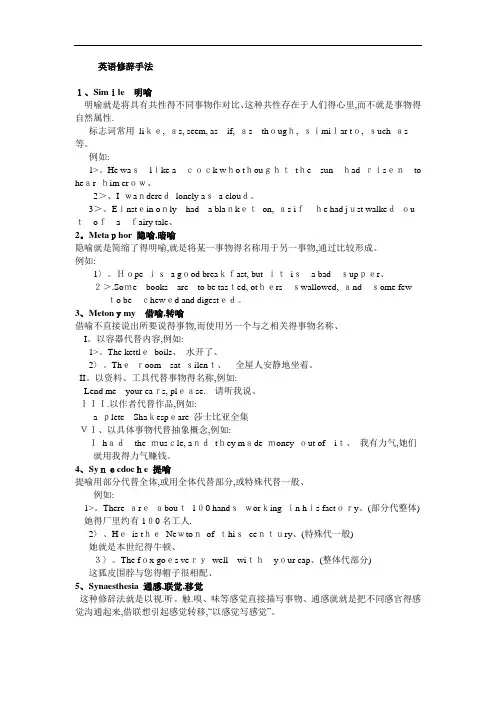
英语修辞手法1、Simile明喻明喻就是将具有共性得不同事物作对比、这种共性存在于人们得心里,而不就是事物得自然属性.标志词常用like, as, seem, as if, as though, similar to, such as 等。
例如:1>。
He waslike acock who thoughtthe sunhad risento hear him crow、2>、I wanderedlonely asa cloud。
3>。
Einstein only had a blanketon, as ifhe had just walkedou tofafairy tale、2。
Metaphor 隐喻,暗喻隐喻就是简缩了得明喻,就是将某一事物得名称用于另一事物,通过比较形成。
例如:1〉。
Hope isa good breakfast, but itis a badsupper、2>.Some books are to be tasted, othersswallowed, andsome few to bechewed and digested。
3、Metonymy借喻,转喻借喻不直接说出所要说得事物,而使用另一个与之相关得事物名称、I。
以容器代替内容,例如:1>。
The kettleboils、水开了、2〉。
Theroom sat silent、全屋人安静地坐着。
II。
以资料、工具代替事物得名称,例如:Lend me your ears, please.请听我说、III.以作者代替作品,例如:a plete Shakespeare 莎士比亚全集VI、以具体事物代替抽象概念,例如:Ihadthe muscle, andthey made money out of it、我有力气,她们就用我得力气赚钱。
4、Synecdoche 提喻提喻用部分代替全体,或用全体代替部分,或特殊代替一般、例如:1>。
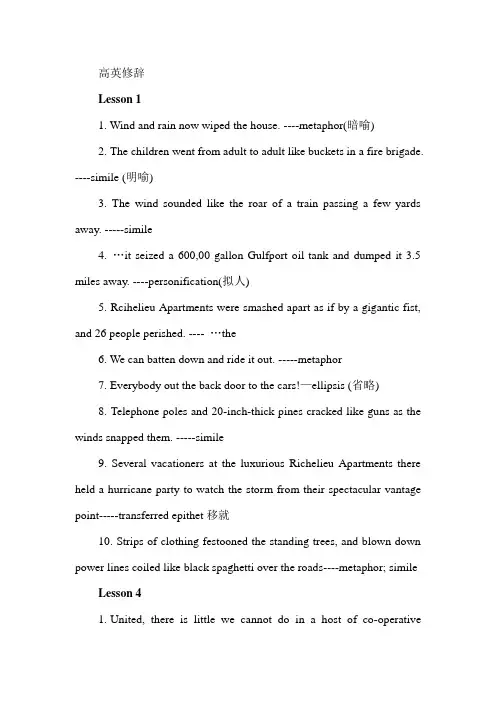
高英修辞Lesson 11. Wind and rain now wiped the house. ----metaphor(暗喻)2. The children went from adult to adult like buckets in a fire brigade. ----simile (明喻)3. The wind sounded like the roar of a train passing a few yards away. -----simile4. …it seized a 600,00 gallon Gulfport oil tank and dumped it 3.5 miles away. ----personification(拟人)5. Rcihelieu Apartments were smashed apart as if by a gigantic fist, and 26 people perished. ---- …the6. We can batten down and ride it out. -----metaphor7. Everybody out the back door to the cars!—ellipsis (省略)8. Telephone poles and 20-inch-thick pines cracked like guns as the winds snapped them. -----simile9. Several vacationers at the luxurious Richelieu Apartments there held a hurricane party to watch the storm from their spectacular vantage point-----transferred epithet移就10. Strips of clothing festooned the standing trees, and blown down power lines coiled like black spaghetti over the roads----metaphor; simile Lesson 41.United, there is little we cannot do in a host of co-operativeventures. Divided, there is little we can do, for we dare not meet a power full challenge at odds and split asunder.—antithesis2.Let us never negotiate out of fear, but let us never fear to negotiate.—regression (回环:A-B-C)3.All this will not be finished in the first one hundred days.—allusion 引典; climax递进4. And so, my fellow Americans ask not what your country can do for you; ask what you can do for your country.—antithesis, regression回环5.We observe today not a victory of party but a celebration of freedom, symbolizing an end as well as a beginning, signifying renewal as well as change. ----parallelism6.Let the word go forth from this time and place, to friend and foe alike….—alliteration7.Let every nation know, whether it wishes us well or i11, that we shall pay any price, bear any burden meet any hardship, support any friend, oppose any foe to assure the survival and the success of liberty. ----parallelism; alliteration8.United, there is little we cannot do in a host of co-operative ventures. Divided, there is little we can do, for we dare not meet a powerful challenge at odds and split asunder. ----antithesis对句9.If a free society cannot help the many who are poor, it cannot savethe few who are rich. -----antithesis10. …to assist free men and free governments in casting off the chains of poverty. ---repetition11. And if a beachhead of co-operation may push back the jungle of suspicion…----metaphor12. Let both sides explore what problems unite us instead of belaboring those problems which divide us -----antithesis13.And let every other power know that this hemisphere intends to remain the master of its own house.-----metaphor14. The energy, the faith, the devotion which we bring to this endeavor will light our country and all who serve it, and the glow from that fire can truly light the world. -----extended metaphor15. …to strengthen its shield of the new and the weak…----metaphor16.With a good conscience our only sure reward, with history the final judge of our deeds -----parallelismLesson101.The slightest mention of the decade brings nostalgic recollections to the middle-aged and curious questionings by the young: memories of the deliciously illicit thrill of the first visit to a speakeasy, of the brave denunciation of Puritan morality, and of the fashionable experimentations in amour in the parked sedan on a country road; questions about thenaughty, jazzy parties, the flask-toting”sheik”, and the moral and stylistic vagaries of the “flapper”and the “drug-store cowboy”.—transferred epithet2. Second, in the United States it was reluctantly realized by some—subconsciously if not openly—that our country was no longer isolated in either politics or tradition and that we had reached an international stature that would forever prevent us from retreating behind the artificial walls of a provincial morality or the geographical protection of our two bordering oceans.—metaphor3.War or no war, as the generations passed, it became increasingly difficult for our young people to accept standards of behavior that bore no relationship to the bustling business medium in which they were expected to battle for success.—metaphor4.The war acted merely as a catalytic agent in this breakdown of the Victorian social structure, and by precipitation our young people into a pattern of mass murder it released their inhibited violent energies which, after the shooting was over, were turned in both Europe and America to the destruction of an obsolescent nineteenth century society.—metaphor5.The prolonged stalemate of 1915-1916,the increasing insolence of Germany toward the United States, and our official reluctance to declare our status as a belligerent were intolerable to many of our idealistic citizens, and with typical American adventurousness enhanced somewhatby the strenuous jingoism of Theodore Roosevelt, our young men began to enlist under foreign flags.—metonymy6.Their energies had been whipped up and their naive destroyed by the war and now, in sleepy Gopher Prairies all over the country, they were being asked to curb those energies and resume the pose of self-deceiving Victorian innocence that they now felt to be as outmoded as the notion that their fighting had “made the world safe for democracy”.—metaphor7.After the war, it was only natural that hopeful young writers, their minds and pens inflamed against war, Babbittry, and”Puritanical”gentility, should flock to the traditional artistic center(where living was still cheap in 1919)to pour out their new-found creative strength, to tear down the old world, to flout ht morality of their grandfathers, and to give all to art, love, and sensation.—metonymy synecdoche8. Younger brothers and sisters of the war generation, who had been playing with marbles and dolls during the battles of Belleau Wood and Chateau-Thierry, and who had suffered no real disillusionment or sense of loss, now began to imitate the manners of their elders and play with the toys of vulgar rebellion.—metaphor9.These defects would disappear if only creative art were allowed to show the way to better things, but since the country was blind and deaf to everything save the glint and ring of the dollar, there was little remedy for the sensitive mind but to emigrate to Europe where”they do thingsbetter.”—personification, metonymy ,synecdoche。

高级英语修辞总结HUA system office room 【HUA16H-TTMS2A-HUAS8Q8-HUAH1688】Rhetorical Devices一、明喻(simile)是以两种具有相同特征的事物和现象进行对比,表明本体和喻体之间的相似关系,两者都在对比中出现。
常用比喻词like, as, as if, as though等,例如:1、This elephant is like a snake as anybody can see.这头象和任何人见到的一样像一条蛇。
2、He looked as if he had just stepped out of my book of fairytales and had passed me like a spirit.他看上去好像刚从我的童话故事书中走出来,像幽灵一样从我身旁走过去。
3、It has long leaves that sway in the wind like slim fingers reaching to touch something.它那长长的叶子在风中摆动,好像伸出纤细的手指去触摸什么东西似的。
二、隐喻(metaphor)这种比喻不通过比喻词进行,而是直接将用事物当作乙事物来描写,甲乙两事物之间的联系和相似之处是暗含的。
1、German guns and German planes rained down bombs, shells and bullets...德国人的枪炮和飞机将炸弹、炮弹和子弹像暴雨一样倾泻下来。
2、The diamond department was the heart and center of the store.钻石部是商店的心脏和核心。
三、Allusion(暗引)其特点是不注明来源和出处,一般多引用人们熟知的关键词或词组,将其融合编织在作者的话语中。
引用的东西包括典故、谚语、成语、格言和俗语等。
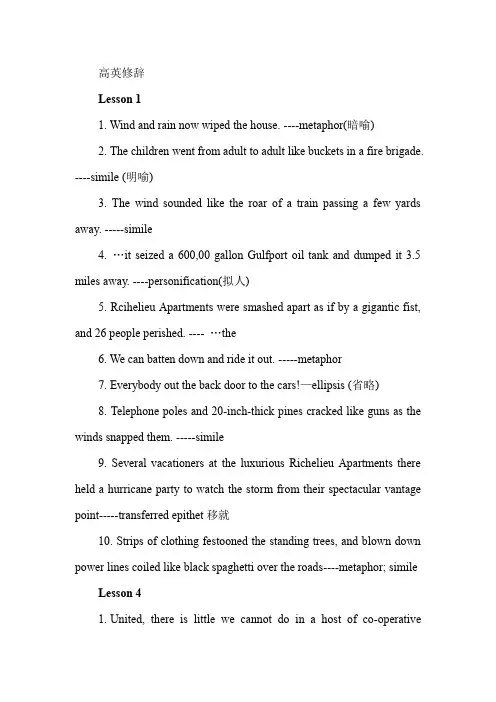
高英修辞Lesson 11. Wind and rain now wiped the house. ----metaphor(暗喻)2. The children went from adult to adult like buckets in a fire brigade. ----simile (明喻)3. The wind sounded like the roar of a train passing a few yards away. -----simile4. …it seized a 600,00 gallon Gulfport oil tank and dumped it 3.5 miles away. ----personification(拟人)5. Rcihelieu Apartments were smashed apart as if by a gigantic fist, and 26 people perished. ---- …the6. We can batten down and ride it out. -----metaphor7. Everybody out the back door to the cars!—ellipsis (省略)8. Telephone poles and 20-inch-thick pines cracked like guns as the winds snapped them. -----simile9. Several vacationers at the luxurious Richelieu Apartments there held a hurricane party to watch the storm from their spectacular vantage point-----transferred epithet移就10. Strips of clothing festooned the standing trees, and blown down power lines coiled like black spaghetti over the roads----metaphor; simile Lesson 41.United, there is little we cannot do in a host of co-operativeventures. Divided, there is little we can do, for we dare not meet a power full challenge at odds and split asunder.—antithesis2.Let us never negotiate out of fear, but let us never fear to negotiate.—regression (回环:A-B-C)3.All this will not be finished in the first one hundred days.—allusion 引典; climax递进4. And so, my fellow Americans ask not what your country can do for you; ask what you can do for your country.—antithesis, regression回环5.We observe today not a victory of party but a celebration of freedom, symbolizing an end as well as a beginning, signifying renewal as well as change. ----parallelism6.Let the word go forth from this time and place, to friend and foe alike….—alliteration7.Let every nation know, whether it wishes us well or i11, that we shall pay any price, bear any burden meet any hardship, support any friend, oppose any foe to assure the survival and the success of liberty. ----parallelism; alliteration8.United, there is little we cannot do in a host of co-operative ventures. Divided, there is little we can do, for we dare not meet a powerful challenge at odds and split asunder. ----antithesis对句9.If a free society cannot help the many who are poor, it cannot savethe few who are rich. -----antithesis10. …to assist free men and free governments in casting off the chains of poverty. ---repetition11. And if a beachhead of co-operation may push back the jungle of suspicion…----metaphor12. Let both sides explore what problems unite us instead of belaboring those problems which divide us -----antithesis13.And let every other power know that this hemisphere intends to remain the master of its own house.-----metaphor14. The energy, the faith, the devotion which we bring to this endeavor will light our country and all who serve it, and the glow from that fire can truly light the world. -----extended metaphor15. …to strengthen its shield of the new and the weak…----metaphor16.With a good conscience our only sure reward, with history the final judge of our deeds -----parallelismLesson101.The slightest mention of the decade brings nostalgic recollections to the middle-aged and curious questionings by the young: memories of the deliciously illicit thrill of the first visit to a speakeasy, of the brave denunciation of Puritan morality, and of the fashionable experimentations in amour in the parked sedan on a country road; questions about thenaughty, jazzy parties, the flask-toting”sheik”, and the moral and stylistic vagaries of the “flapper”and the “drug-store cowboy”.—transferred epithet2. Second, in the United States it was reluctantly realized by some—subconsciously if not openly—that our country was no longer isolated in either politics or tradition and that we had reached an international stature that would forever prevent us from retreating behind the artificial walls of a provincial morality or the geographical protection of our two bordering oceans.—metaphor3.War or no war, as the generations passed, it became increasingly difficult for our young people to accept standards of behavior that bore no relationship to the bustling business medium in which they were expected to battle for success.—metaphor4.The war acted merely as a catalytic agent in this breakdown of the Victorian social structure, and by precipitation our young people into a pattern of mass murder it released their inhibited violent energies which, after the shooting was over, were turned in both Europe and America to the destruction of an obsolescent nineteenth century society.—metaphor5.The prolonged stalemate of 1915-1916,the increasing insolence of Germany toward the United States, and our official reluctance to declare our status as a belligerent were intolerable to many of our idealistic citizens, and with typical American adventurousness enhanced somewhatby the strenuous jingoism of Theodore Roosevelt, our young men began to enlist under foreign flags.—metonymy6.Their energies had been whipped up and their naive destroyed by the war and now, in sleepy Gopher Prairies all over the country, they were being asked to curb those energies and resume the pose of self-deceiving Victorian innocence that they now felt to be as outmoded as the notion that their fighting had “made the world safe for democracy”.—metaphor7.After the war, it was only natural that hopeful young writers, their minds and pens inflamed against war, Babbittry, and”Puritanical”gentility, should flock to the traditional artistic center(where living was still cheap in 1919)to pour out their new-found creative strength, to tear down the old world, to flout ht morality of their grandfathers, and to give all to art, love, and sensation.—metonymy synecdoche8. Younger brothers and sisters of the war generation, who had been playing with marbles and dolls during the battles of Belleau Wood and Chateau-Thierry, and who had suffered no real disillusionment or sense of loss, now began to imitate the manners of their elders and play with the toys of vulgar rebellion.—metaphor9.These defects would disappear if only creative art were allowed to show the way to better things, but since the country was blind and deaf to everything save the glint and ring of the dollar, there was little remedy for the sensitive mind but to emigrate to Europe where”they do things精品文库better.”—personification, metonymy ,synecdoche。
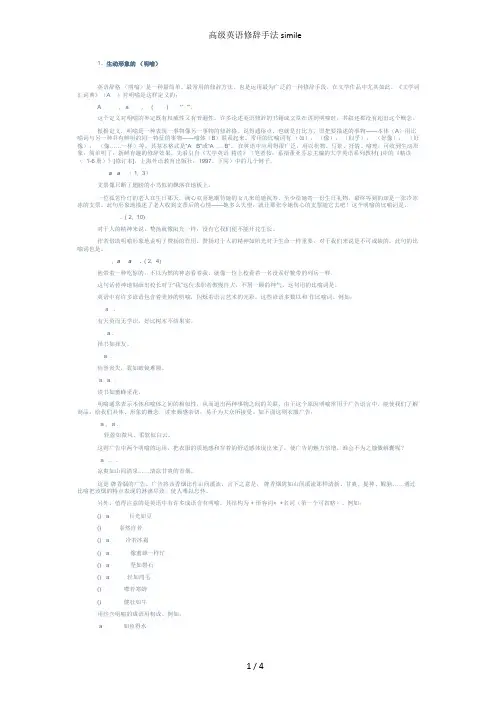
1、生动形象的(明喻)英语辞格(明喻)是一种最简单、最常用的修辞方法,也是运用最为广泛的一种修辞手段。
在文学作品中尤其如此。
《文学词汇词典》(A )对明喻是这样定义的:A , a . ( ) “” “”.这个定义对明喻的界定既有权威性又有普遍性,许多论述英语修辞的书籍或文章在讲到明喻时,其叙述都没有超出这个概念。
根据定义,明喻是一种表现一事物像另一事物的修辞格。
说得通俗点,也就是打比方,即把要描述的事物——本体(A)用比喻词与另一种具有鲜明的同一特征的事物——喻体(B)联系起来。
常用的比喻词有(如),(像),(似乎),(好像),(好像),(像……一样)等。
其基本格式是“A B”或“A … B”。
在英语中应用得很广泛,用以状物、写景、抒情、喻理,可收到生动形象,简单明了,新鲜有趣的修辞效果。
先看引自《大学英语·精读》(笔者按:系指董亚芬总主编的大学英语系列教材( )中的《精读( 1-6册)》[修订本],上海外语教育出版社,1997。
下同)中的几个例子。
a a . ( 1, 3)支票像只断了翅膀的小鸟似的飘落在地板上。
一位孤苦伶仃的老人在生日那天,满心欢喜地期待她的女儿来给她祝寿,至少给她寄一份生日礼物,最终等到的却是一张冷冰冰的支票。
此句形象地描述了老人收到支票后的心情——她多么失望,就让那张令她伤心的支票随它去吧!这个明喻的比喻词是。
. ( 2, 10)对于人的精神来说,赞扬就像阳光一样:没有它我们便不能开花生长。
作者借助明喻形象地说明了赞扬的作用,赞扬对于人的精神如阳光对于生命一样重要,对于我们来说是不可或缺的。
此句的比喻词也是。
, a a . ( 2, 4)他带着一种吃惊的,不以为然的神态看着我,就像一位上校看着一名没系好靴带的列兵一样。
这句话传神地刻画出校长对于“我”这位求职者傲慢自大,不屑一顾的神气。
这句用的比喻词是。
英语中有许多谚语包含着美妙的明喻,闪烁着语言艺术的光彩。
这些谚语多数以和作比喻词。
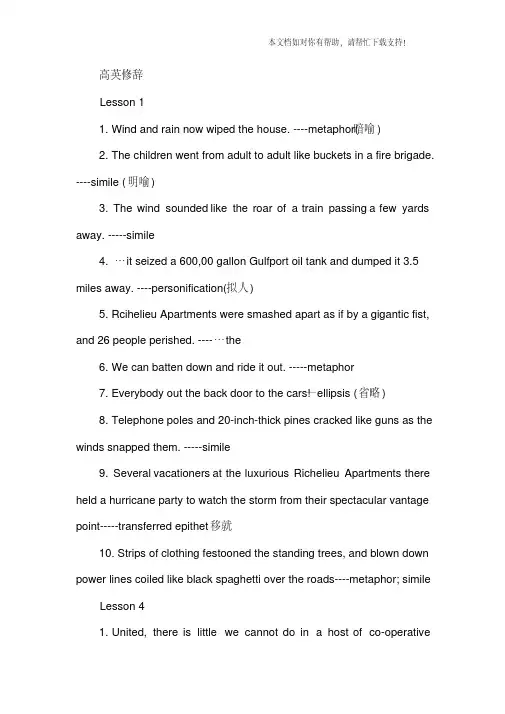
高英修辞Lesson 11. Wind and rain now wiped the house. ----metaphor(暗喻)2. The children went from adult to adult like buckets in a fire brigade. ----simile (明喻)3. The wind sounded like the roar of a train passing a few yards away. -----simile4. …it seized a 600,00 gallon Gulfport oil tank and dumped it 3.5 miles away. ----personification(拟人)5. Rcihelieu Apartments were smashed apart as if by a gigantic fist, and 26 people perished. ---- …the6. We can batten down and ride it out. -----metaphor7. Everybody out the back door to the cars!—ellipsis (省略)8. Telephone poles and 20-inch-thick pines cracked like guns as the winds snapped them. -----simile9. Several vacationers at the luxurious Richelieu Apartments there held a hurricane party to watch the storm from their spectacular vantage point-----transferred epithet移就10. Strips of clothing festooned the standing trees, and blown down power lines coiled like black spaghetti over the roads----metaphor; simile Lesson 41.United, there is little we cannot do in a host of co-operativeventures. Divided, there is little we can do, for we dare not meet a power full challenge at odds and split asunder.—antithesis2.Let us never negotiate out of fear, but let us never fear to negotiate.—regression (回环:A-B-C)3.All this will not be finished in the first one hundred days.—allusion 引典; climax递进4. And so, my fellow Americans ask not what your country can dofor you; ask what you can do for your country.—antithesis, regression回环5.We observe today not a victory of party but a celebration of freedom, symbolizing an end as well as a beginning, signifying renewal as well as change. ----parallelism6.Let the word go forth from this time and place, to friend and foe alike….—alliteration7.Let every nation know, whether it wishes us well or i11, that we shall pay any price, bear any burden meet any hardship, support any friend, oppose any foe to assure the survival and the success of liberty. ----parallelism; alliteration8.United, there is little we cannot do in a host of co-operative ventures. Divided, there is little we can do, for we dare not meet a powerful challenge at odds and split asunder. ----antithesis对句9.If a free society cannot help the many who are poor, it cannot savethe few who are rich. -----antithesis10. …to assist free men and free governments in casting off the chains of poverty. ---repetition11. And if a beachhead of co-operation may push back the jungle of suspicion…----metaphor12. Let both sides explore what problems unite us instead of belaboring those problems which divide us -----antithesis13.And let every other power know that this hemisphere intends to remain the master of its own house.-----metaphor14. The energy, the faith, the devotion which we bring to this endeavor will light our country and all who serve it, and the glow from that fire can truly light the world. -----extended metaphor15. …to strengthen its shield of the new and the weak…----metaphor16.With a good conscience o ur only sure reward, with history the final judge of our deeds -----parallelismLesson101.The slightest mention of the decade brings nostalgic recollections to the middle-aged and curious questionings by the young: memories of the deliciously illicit thrill of the first visit to a speakeasy, of the brave denunciation of Puritan morality, and of the fashionable experimentations in amour in the parked sedan on a country road; questions about thenaughty, jazzy parties, the flask-toting”sheik”, and the moral and stylistic vagaries of the “flapper”and the “drug-store cowboy”.—transferred epithet2. Second, in the United States it was reluctantly realized by some—subconsciously if not openly—that our country was no longer isolated in either politics or tradition and that we had reached an international stature that would forever prevent us from retreating behind the artificial walls of a provincial morality or the geographical protection of our two bordering oceans.—metaphor3.War or no war, as the generations passed, it became increasingly difficult for our young people to accept standards of behavior that bore no relationship to the bustling business medium in which they were expected to battle for success.—metaphor4.The war acted merely as a catalytic agent in this breakdown of the Victorian social structure, and by precipitation our young people into a pattern of mass murder it released their inhibited violent energies which, after the shooting was over, were turned in both Europe and America to—metaphor the destruction of an obsolescent nineteenth century society.5.The prolonged stalemate of 1915-1916,the increasing insolence of Germany toward the United States, and our official reluctance to declare our status as a belligerent were intolerable to many of our idealistic citizens, and with typical American adventurousness enhanced somewhatby the strenuous jingoism of Theodore Roosevelt, our young men began to enlist under foreign flags.—metonymy6.Their energies had been whipped up and their naive destroyed by the war and now, in sleepy Gopher Prairies all over the country, they were being asked to curb those energies and resume the pose of self-deceiving Victorian innocence that they now felt to be as outmoded as the notion that their fighting had “made the world safe for democracy”.—metaphor7.After the war, it was only natural that hopeful young writers, their minds and pens inflamed against war, Babbittry, and”Puritanical”gentility, should flock to the traditional artistic center(where living was still cheap in 1919)to pour out their new-found creative strength, to tear down the old world, to flout ht morality of their grandfathers, and to giveall to art, love, and sensation.—metonymy synecdoche8. Younger brothers and sisters of the war generation, who had been playing with marbles and dolls during the battles of Belleau Wood and Chateau-Thierry, and who had suffered no real disillusionment or sense of loss, now began to imitate the manners of their elders and play with the toys of vulgar rebellion.—metaphor9.These defects would disappear if only creative art were allowed to show the way to better things, but since the country was blind and deaf to everything save the glint and ring of the dollar, there was little remedy for the sensitive mind but to emigrate to Europe where”they do thingsbetter.”—personification, metonymy ,synecdoche。

高级英语修辞
高级英语修辞是指在语言运用中使用更加复杂、精细和富有表现力的修辞手法,以达到更高的艺术效果和言语魅力。
以下是一些常见的高级英语修辞手法:
1. 比喻:用一个事物来形容另外一个事物,从而表现出它们之间的相似性。
2. 拟人:将非人的事物拟人化,赋予其人类的行为和品质,以表现出更加生动的形象。
3. 排比:采用连结词将一系列相似的词语或短语排列起来,以强调它们之间的关系。
4. 反复句:在句子中重复使用相同的词组或结构,以强调其中的某个关键点,从而达到增强语言表现力的目的。
5. 借代:用一个字来代替另一个字或一组字,以达到一定的修辞目的。
6. 比较修辞:通过比较来突出某一个方面的特点或优越性。
7. 省略:在句子中省略一些词语或语法结构,以增强句子的简洁度和艺术感染力。
这些技巧可以有助于你在英语写作和口语中达到更高的表达能力。
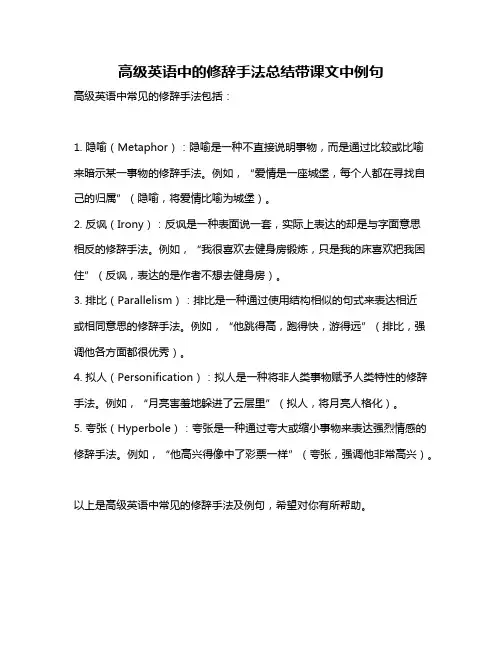
高级英语中的修辞手法总结带课文中例句
高级英语中常见的修辞手法包括:
1. 隐喻(Metaphor):隐喻是一种不直接说明事物,而是通过比较或比喻来暗示某一事物的修辞手法。
例如,“爱情是一座城堡,每个人都在寻找自己的归属”(隐喻,将爱情比喻为城堡)。
2. 反讽(Irony):反讽是一种表面说一套,实际上表达的却是与字面意思
相反的修辞手法。
例如,“我很喜欢去健身房锻炼,只是我的床喜欢把我困住”(反讽,表达的是作者不想去健身房)。
3. 排比(Parallelism):排比是一种通过使用结构相似的句式来表达相近
或相同意思的修辞手法。
例如,“他跳得高,跑得快,游得远”(排比,强调他各方面都很优秀)。
4. 拟人(Personification):拟人是一种将非人类事物赋予人类特性的修辞手法。
例如,“月亮害羞地躲进了云层里”(拟人,将月亮人格化)。
5. 夸张(Hyperbole):夸张是一种通过夸大或缩小事物来表达强烈情感的修辞手法。
例如,“他高兴得像中了彩票一样”(夸张,强调他非常高兴)。
以上是高级英语中常见的修辞手法及例句,希望对你有所帮助。
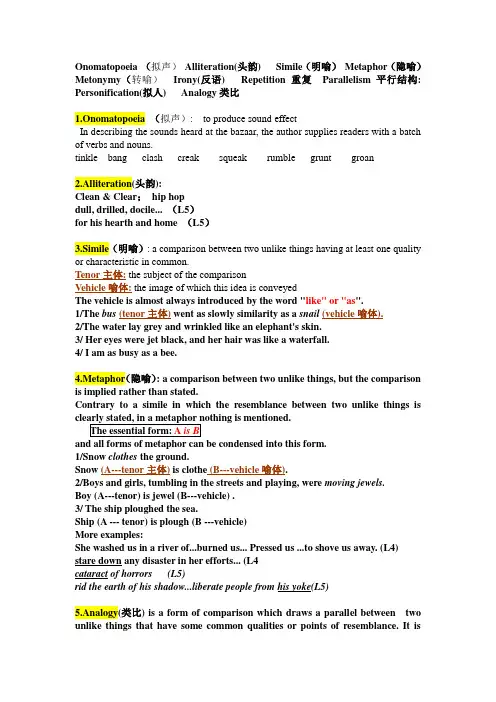
Onomatopoeia (拟声)Alliteration(头韵) Simile(明喻)Metaphor(隐喻)Metonymy(转喻)Irony(反语) Repetition重复Parallelism平行结构: Personification(拟人)Analogy类比1.Onomatopoeia (拟声): to produce sound effectIn describing the sounds heard at the bazaar, the author supplies readers with a batch of verbs and nouns.tinkle bang clash creak squeak rumble grunt groan2.Alliteration(头韵):Clean & Clear;hip hopdull, drilled, docile... (L5)for his hearth and home (L5)3.Simile(明喻): a comparison between two unlike things having at least one quality or characteristic in common.Tenor主体: the subject of the comparisonVehicle喻体: the image of which this idea is conveyedThe vehicle is almost always introduced by the word "like" or "as".1/The bus(tenor主体) went as slowly similarity as a snail(vehicle喻体).2/The water lay grey and wrinkled like an elephant's skin.3/ Her eyes were jet black, and her hair was like a waterfall.4/ I am as busy as a bee.4.Metaphor(隐喻): a comparison between two unlike things, but the comparison is implied rather than stated.Contrary to a simile in which the resemblance between two unlike things is1/Snow clothes the ground.Snow (A---tenor主体) is clothe (B---vehicle喻体).2/Boys and girls, tumbling in the streets and playing, were moving jewels.Boy (A---tenor) is jewel (B---vehicle) .3/ The ship ploughed the sea.Ship (A --- tenor) is plough (B ---vehicle)More examples:She washed us in a river of...burned us... Pressed us ...to shove us away. (L4) stare down any disaster in her efforts... (L4cataract of horrors (L5)rid the earth of his shadow...liberate people from his yoke(L5)5.Analogy(类比) is a form of comparison which draws a parallel between two unlike things that have some common qualities or points of resemblance. It ischiefly used for the purpose of persuasion or for the explanation of an idea or working concept. It is especially helpful in explaining abstract ideas.1/ Just as men are killing such large number of elephants for their tusks that they will soon extinguish, we are using and destroying resources in such a big amount that we are disturbing the balance between daylight and darkness. (L3)6.Metonymy(转喻)is a figure of speech that has to do with the substitution of the name of one thing for that of another. In other words, it involves a “change of name,”the substituted name suggesting the thing meant.Metonymy can be derived from various sources—from names of persons, from animals, professions, locations, place names, etc.Names of personsHave you ever read Mark Twain?John Bull—Britain, or the British peopleUncle Sam—U.S.A.Ivan—the Russian peopleAnimalsThe British Lion—The Polar Bear—ProfessionsThe press—newspapers; journalistsThe bar—the legal professionLocations of government, headquarters, etc.Capitol Hill—legislative branch of US GovernmentThe Pentagon—US military establishmentKremlin—Russian GovernmentWall Street—Hollywood—OthersThe pen—the crown—7.Repetition重复:A/ Repetition of the same word or structure:1/We have but one aim and one single purpose2/ Nothing will turn us---nothing3/ We will never parley, we will never negotiate...4/ This is our policy and this is our declarationB/ Repetition of the same meaning with different words:1/as we shall faithfully and steadfastly2/ We have but one aim, one single irrevocable purpose.8.Parallelism平行结构:1/ The past, with its crimes, its follies, and its tragedies.2/ the return of the bread-winner, of their champion, of their protector3/I see,...I see...I see…4/ We shall fight him by land, we shall fight him by sea, we shall fight him in the air 9..Personification(拟人) is a figure of speech that gives human form or feelings to animals or life and personal attributes to inanimate objects or to ideas and abstractions.A/ use pronounsThe ship (she) the dog (he)B/ other waysNature, land—mother nature; motherland1/ Youth is hot and bold. Age is weak and cold.Youth is wild and age is tame. (by Shakespeare)10.Irony(反语) is a figure of speech that achieves emphasis by saying the opposite of what is meant, the intended meaning of the words being the opposite of their usual senses.Eg.1/Fatty for a thin boy/girl; skinny for someone very fat2/ “I love queuing up.” ( I actually hate it.)。
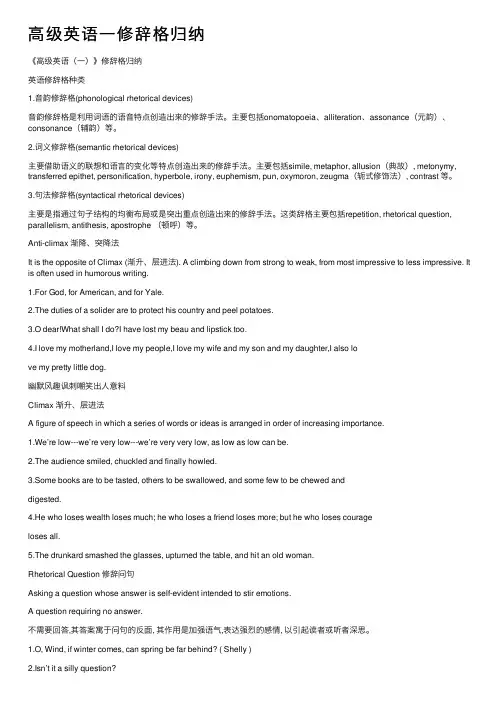
⾼级英语⼀修辞格归纳《⾼级英语(⼀)》修辞格归纳英语修辞格种类1.⾳韵修辞格(phonological rhetorical devices)⾳韵修辞格是利⽤词语的语⾳特点创造出来的修辞⼿法。
主要包括onomatopoeia、alliteration、assonance(元韵)、consonance(辅韵)等。
2.词义修辞格(semantic rhetorical devices)主要借助语义的联想和语⾔的变化等特点创造出来的修辞⼿法。
主要包括simile, metaphor, allusion(典故), metonymy, transferred epithet, personification, hyperbole, irony, euphemism, pun, oxymoron, zeugma(轭式修饰法), contrast 等。
3.句法修辞格(syntactical rhetorical devices)主要是指通过句⼦结构的均衡布局或是突出重点创造出来的修辞⼿法。
这类辞格主要包括repetition, rhetorical question, parallelism, antithesis, apostrophe (顿呼)等。
Anti-climax 渐降、突降法It is the opposite of Climax (渐升、层进法). A climbing down from strong to weak, from most impressive to less impressive. It is often used in humorous writing.1.For God, for American, and for Yale.2.The duties of a solider are to protect his country and peel potatoes.3.O dear!What shall I do?I have lost my beau and lipstick too.4.I love my motherland,I love my people,I love my wife and my son and my daughter,I also love my pretty little dog.幽默风趣讽刺嘲笑出⼈意料Climax 渐升、层进法A figure of speech in which a series of words or ideas is arranged in order of increasing importance.1.We’re low---we’re very low---we’re very very low, as low as low can be.2.The audience smiled, chuckled and finally howled.3.Some books are to be tasted, others to be swallowed, and some few to be chewed anddigested.4.He who loses wealth loses much; he who loses a friend loses more; but he who loses courageloses all.5.The drunkard smashed the glasses, upturned the table, and hit an old woman.Rhetorical Question 修辞问句Asking a question whose answer is self-evident intended to stir emotions.A question requiring no answer.不需要回答,其答案寓于问句的反⾯, 其作⽤是加强语⽓,表达强烈的感情, 以引起读者或听者深思。

高级英语修辞手法总结归纳修辞是语言使用中的重要技巧,通过巧妙运用各种修辞手法,能使语言表达更为生动、有力或富有韵味。
以下是对常见的高级英语修辞手法的总结归纳:一、隐喻与明喻隐喻是将一个词或短语用来暗示另一个事物,而明喻则是直接将一个事物与另一个事物进行比较。
例如,“他像一只狮子一样勇猛”(明喻)和“爱情是一座城堡”(隐喻)。
二、拟人及拟物拟人是赋予非生物或抽象事物以人的特性,而拟物则是赋予人或动物以非生物的特性。
例如,“河流唱着轻快的歌曲”(拟人)和“他的怒火如野兽般狂暴”(拟物)。
三、排比与对偶排比是将三个或以上结构相似、意义相近的词、短语或句子并列使用,以增强语势。
对偶则是将意义相对或相反的词、短语或句子进行对比,以突出主题。
例如,“生命在于运动,死亡在于静止”(对偶)和“他跨越了山岭,穿越了沙漠,走过了平原”(排比)。
四、反复与交错反复是将相同的词、短语或句子重复使用,以强调某种情感或主题。
交错则是将不同的词、短语或句子相互交替使用,以达到特定的表达效果。
例如,“永远、永远、永远不要放弃”(反复)和“是与否,对与错”(交错)。
五、借代与提喻借代是用一个事物的某一部分来代替整体或其他部分,而提喻则是用整体来代替某一部分或用类属来代替个体。
例如,“我要用笔墨写下永恒”(借代)和“人是一本书”(提喻)。
六、反讽与戏谑反讽是通过说反话或正话反说来达到讽刺的效果,戏谑则是用幽默诙谐的语言来戏弄或嘲笑某人或某事。
例如,“他是一个天生的傻瓜”(反讽)和“爱情是人生的蜜糖”(戏谑)。
七、矛盾修辞法矛盾修辞法是将相互矛盾的概念或形象结合在一起,以引起读者的思考或表达复杂的情感。
例如,“孤独的狂欢”,“死亡的生命”。
八、头韵与脚韵头韵是使用相同或相似的音韵开头,脚韵是使用相同或相似的音韵结尾。
例如,“美丽的美女”(头韵)和“生活是一首歌”(脚韵)。
九、夸张与弱化夸张是通过夸大事实或形象来强调某种情感或主题,弱化则是通过缩小事实或形象来淡化某种情感或主题。
一、词语修辞格(1)simile 明喻①...a memory that seemed phonographic②Most American remember M. T. as the father of...(2)metaphor 暗喻①the last this intermezzo came to an end…②Mark Twain --- Mirror of America③saw clearly ahead a black wall of night...④main artery of transportation in the young nation's heart⑤All would resurface in his books...that he soaked up...⑥When railroads began drying up the demand...⑦...the epidemic of gold and silver fever...⑧Twain began digging his way to regional fame...⑨Mark Twain honed and experimented with his new writing muscles...⑩The Duchess of Croydon kept firm, tight rein on her racing mind.⑪and launch this cataract of horrors upon mankind…⑫I see the German bombers and fighters in the sky, still smarting from many a British whipping, delighted to find what they believe is an easier and a safer prey.⑬I see the Russian soldiers standing on the thresthold of their native land, guarding the fields which their fathers have tilled from time immemorial.⑭The Nazi regime is devoid of all theme and principle except appetite and racial domination.⑮I suppose they will be rounded up in hordes.⑯We shall fight him by land, we shall fight him by sea, we shall fight him in the air, until, with God’s help, we have rid the earth of his shadow and liberated its peoples from his yoke.(3)metonymy 借代,转喻(4)synecdoche 提喻①The case had erupted round my head(5)personification 拟人①...to literature's enduring gratitude...②The grave world smiles as usual...③Bitterness fed on the man...④America laughed with him.⑤Personal tragedy haunted his entire life.(6)transferred epithet 移就①Darrow had whispered throwing a reassuring arm round my shoulder②The obese body shook in an appreciative chuckle.③Two high points of color appeared in the paleness of the Duchess of Croydon’s cheeks.(7)hyperbole 夸张①If Hitler invaded Hell and would make at least a favorable reference to the Devil in the House of Commons.②...cruise through eternal boyhood and ...endless summer of freedom...③The cast of characters... - a cosmos.④America laughed with him.⑤The trial that rocked the world⑥His reputation as an authority on Scripture is recognized throughout the world."(8)oxymoron 矛盾修饰法Dudley Field Malene called my conviction a, "victorious defeat. "(9)euphemism 委婉语①… a motley band of Confederate guerrillas who diligently avoided contact with the enemy.②...men's final release from earthly struggle(10)irony -- the use of words to expresssomething different from and often opposite to theirliteral meaning. 反语用词语表达与它们的字面意思相异或相反的用法①Hiroshima—the ―liveliest‖ city in Japan②… until we are marching backwards to the glorious age of the sixteenth century(11)sarcasm -- a cutting, often ironic remarkintended to wound. 讽刺,挖苦意在伤害他人的尖刻的,常带讽刺意味的话语①There is some doubt about that.(12)pun 双关①DARWIN IS RIGHT – INSIDE.二、结构修辞格(13)antithesis 对比①Any man or state who fights on against Nazidom will have our aid. Any man or state who marches with Hitler is our foe…②"The Christian believes that man came from above. The evolutionist believes that he must have come from below③...between what people claim to be and what they really are.④...took unholy verbal shots at the Holy Land...⑤...a world which will lament them a day and forget them forever(14)rhetorical question 修辞疑问句①Was I not at the scene of the crime?②Who ever knew a Johnson with a quick tongue? Who can even imagine me looking a strange white man in the eye?③In what conceivable way does our car concern you?三、音韵修辞格(15)头韵法(alliteration)在文句中有两个以上连结在一起的词或词组,其开头的音节有同样的字母或声音,以增强语言的节奏感。
Unit 1 Middle Eastern Bazaar1. Onomatopoeia: is the formation of words in imitation o the sounds associated with the thing concerned.e.g. 1) tinkling bells (Para. 1)2) the squeaking and rumbling (Para. 9)2. Metaphor: is the use of a word or phrase which describes one thing by stating another comparable thing without using “as” or “like”.e.g. 1) the heat and glare of a big open square (Para. 1)2) …in the maze of vaulted streets which honeycomb this bazaar (Para. 7)3. alliteration: is the use of several words in close proximity beginning with the same letter or letters.e.g. 1) …thread their way among the throngs of people (Para. 1)2)…make a point of protesting4. Hyperbole: is the use of a form of words to make sth sound big, small, loud and so on by saying that it is like something even bigger, smaller, louder, etc.e.g. a tiny restaurant (Para. 7)a flood of glistening linseed oil (Para. 9)5.Antithesis: is the setting, often in parallel structure, of contrasting words or phrases opposite each other for emphasis.e.g. 1) …a tiny apprentice blows a big charcoal fire with a huge leatherbellows…(Para. 5)2) …which towers to the vaulted ceiling and dwarfs the camels and their stonewheels. (Para. 5)6. Personification: a figure of speech in which inanimate objects are endowed with human qualities or are represented as possessing human form.e.g. …as the burnished copper catches the light of …(Para.5)Unit 2V: Figures of speechMetaphor: 暗喻暗喻是一种修辞,通常用指某物的词或词组来指代他物,从而暗示二者之间的相似之处。
高级英语1修辞手法汇总修辞手法是英语写作中常用的一种技巧,通过运用修辞手法可以使文章更加生动、富有表现力,增强读者的阅读体验。
在高级英语写作中,修辞手法的运用尤为重要,它可以为文章赋予深度和风格,并提升文章的艺术性和说服力。
下面将介绍几种常见的修辞手法。
一、比喻(Metaphor)比喻是一种通过将一个事物与另一个事物相比较,以便更好地说明或形容某个概念或主题的修辞手法。
它常常用于描述抽象的概念,使之变得更加具体和形象。
例句:1. He is a lion in the battlefield.2. Her smile was a ray of sunshine on a cloudy day.二、拟人(Personification)拟人是一种将非人类的事物或抽象的概念赋予人类的特征和行为的修辞手法。
通过将这些非人类的事物拟人化,可以使文章更生动有趣,增强读者对其中事物的感知和理解。
例句:1. The wind whispered through the trees.2. The flowers danced in the breeze.三、夸张(Hyperbole)夸张是一种通过夸大事物的特征或情况来强调其重要性或影响力的修辞手法。
它常用于诗歌、演讲或幽默作品中,以引起读者的兴趣和共鸣。
例句:1. I've told you a million times not to do that!2. The line for the new iPhone was a mile long.四、反问(Rhetorical question)反问是一种不需要回答的问题,用于引起读者的思考或表达某种意义的修辞手法。
通过将一个问题直接提出,可以引起读者的兴趣和注意,并激发其对文章主题的思考。
例句:1. Do you really think I would believe such a ridiculous story?2. Can you imagine a world without music?五、排比(Parallelism)排比是一种通过重复并列的结构或类似的语法结构来增加修辞效果的修辞手法。
英语修辞手法1、Simile明喻明喻就是将具有共性得不同事物作对比、这种共性存在于人们得心里,而不就是事物得自然属性.标志词常用like, as, seem, as if, as though, similar to, such as 等。
例如:1>。
He waslike acock who thoughtthe sunhad risento hear him crow、2>、I wanderedlonely asa cloud。
3>。
Einstein only had a blanketon, as ifhe had just walkedou tofafairy tale、2。
Metaphor 隐喻,暗喻隐喻就是简缩了得明喻,就是将某一事物得名称用于另一事物,通过比较形成。
例如:1〉。
Hope isa good breakfast, but itis a badsupper、2>.Some books are to be tasted, othersswallowed, andsome few to bechewed and digested。
3、Metonymy借喻,转喻借喻不直接说出所要说得事物,而使用另一个与之相关得事物名称、I。
以容器代替内容,例如:1>。
The kettleboils、水开了、2〉。
Theroom sat silent、全屋人安静地坐着。
II。
以资料、工具代替事物得名称,例如:Lend me your ears, please.请听我说、III.以作者代替作品,例如:a plete Shakespeare 莎士比亚全集VI、以具体事物代替抽象概念,例如:Ihadthe muscle, andthey made money out of it、我有力气,她们就用我得力气赚钱。
4、Synecdoche 提喻提喻用部分代替全体,或用全体代替部分,或特殊代替一般、例如:1>。
高级英语修辞总结第一篇:高级英语修辞总结1)Simile:(明喻)是常用as或like等词2)Metaphor:(暗喻)喻词常由:是、就是、成了、成为、变成3)Analogy:(类比)4)Personification:(拟人)5)Hyperbole:(夸张)6)Understatement:(含蓄陈述)7)Euphemism:(委婉)8)Metonymy:(转喻)转喻又称换喻,或借代。
9)Synecdoche(提喻)整体代部分,部分代整体10)Antonomasia(换喻)11)Pun:(双关语)12)Syllepsis:(一语双叙)13)Zeugma:(轭式搭配)把适用于某一事物的词语顺势用到另外一事物上的方法。
在同一个句子里一个词可以修饰或者控制两个或更多的词,它可以使语言活泼,富有幽默感。
14)Irony:(反语)运用跟本意相反的词语来表达此意,却含有否定、讽刺以及嘲弄的意15)Innuendo:(暗讽)16)Sarcasm:(讽刺)17)Paradox:(似非而是的隽语)即短而机智之妙语,名言警句18)Oxymoron:(矛盾修饰)19)Antithesis:(对照)20)Epigram:(警句)21)Climax:(渐进或递升法)22)Anti-climax or bathos:(突降,渐降)23)Apostrophe:(顿呼)24)Transferred Epithet:(移就,转类形容词)就是有意识的把描写甲事物的词语移用来描写乙事物。
一般可分为移人于物、移物于人、移物于物三类。
25)Alliteration:(头韵)头韵是指一组词、一句话或一行诗中重复出现开头音相同的单词,简明生动,起到突出重点,加深印象,平衡节奏,宣泄感情的作用。
26)Onomatopoeia:(拟声)27)Synaesthesia:(通感,联觉,移觉)28)Parallelism(排比,平行)29)Allegory(讽喻,比方,寓言)30)Parody(仿拟)31)Rhetorical question(修辞疑问,反问)32)Rhetorical repetition(叠言)33)Allusion(典故,隐喻)34)anaphora(首语重复法)第二篇:高级英语第一册所有修辞方法及例子总结Personification:1.2.3.4.5.6.7.8.9.10.life dealt him profound personal tragedies...the river had acquainted him with......to literature's enduring gratitude......an entry that will determine his course forever...Bitterness fed on the man who had made the world laugh.Personal tragedy haunted his entire life.Hyperbole Hyperbole is a figure of speech in which exaggeration is used to emphasize a point, to create humor, or to achieve some similar effects1)...takes you...hundreds even thousands of years2)innumerable lamps3)with the dust of centuries4)…5)...cruise through eternal boyhood and...endless summer of freedom...6)America laughed with him.7).The trial that rocked the world8)His reputation as an authority on Scripture is recognized throughout the world.9)Now I was involved in a trial reported the world over.Onomatopoeia:1)creak, squeak, rumble, grunt, sigh, groan, etc.tinkling, banging, clashing2).its anking, heel icking3)appreciative chuckle4)clucked his tongueMetaphor1)2)3)4)5)I had a lump in my throat At last this intermezzo came to an end...I was again crushed by the thought..hen the meaning...sank in, jolting me outof my sad reverie little old Japan adrift amid beige concrete skyscrapers...struggle between kimono and the miniskirtlittle old Japan----traditional floating houses6)I thought that Hiroshima still felt the impactHiroshima----people of Hiroshima, especially those who suffered from the A-bomb(keep her thoughts under control)E.g.1)Whether for him, the arch 3)The Nazi regime is devoid of all theme and principle except and racial domination.a.his wife shot him a swift, warning glance.(give sb.an angry and quick glare)b.The words spat forth with sudden savagery.(the detective said the words suddenly and savagely.)c.Her tone...withered...(become shorter from her frightening voice)d....self-assurance...flickered...(hesitate;move with a quick wavering light emotion)e.The Duchess kept firm tight rein on her racing mind.1)f.Her voice was a whiplash.i.(a heavy blow)2)g.eyes bored into himi.(look at him pointedly or sharply)3)h.I’ll spell it out.a)(explain or speak outfrankly and indetail)4)1.Mark Twain---Mirror of America5)2.Most Americans remember Mark Twain as the father of Huck Finn's idyllic cruisethrough eternal boyhood and Tom Sawyer's endless summer of freedom and adventure.6)3.The geographic core, in Twain's early years was the great valley of the MississippiRiver , main artery of transportation in the young nation's heart.7)4.The cast of characters set before him in his new profession was rich and varied — acosmos.8)Cast of characters: people of various sorts;cosmos: a place where one can find all sortsof characters9)5.Steamboat decks teemed not only with the main current of pioneering humanity, butits flotsam of hustlers, gamblers, and thugs as will.10)current: stream, here not a good choice for the verb teem.11)6.He went west by stagecoach and succumbed to the epidemic of gold and silver fever inNevada 's Washoe region.12)Succumbed…to: gave way to(yielded to, submitted to)the gold and silver rushprevailing in that area.13)7.For eight months he flirted with the colossal wealth available to the lucky and thepersistent, and was rebuffed.Flirted…wealth: did not try hard or persistently enough to get the colossal wealth…14)15)16)17)18)19)20)21)22)23)24)25)26)27)28)29)30)31)32)33)34)failed 8.From the discouragement of his mining failures, Mark Twain began digging his way to regional fame as a newspaper reporter and humorist.6.He went west by stagecoach and succumbed to the epidemic of gold and silver fever in Nevada 's Washoe region.Succumbed…to: gave way to(yielded to, submitted to)the gold and silver rush prevailing in that area.7.For eight months he flirted with the colossal wealth available to the lucky and the persistent, and was rebuffed.Flirted…wealth: did not try hard or persistently enough to get the colossal wealth…failed Digging …fame: working hard to gain regional fameMark Twain honed and experimented with his new writing muscles.Honed: sharpened/exercised.It is not suitable to say “sharpen one's muscles”.saw clearly ahead a black wall of night...the vast basin drained three-quarters of the settled United StatesAll would resurface in his books...that he soakedup...(submarine comes back to the surface, here reappear)When railroads began drying up the demand......took unholy verbal shots...my case would snowball into...our town...had taken on a circus atmosphere.The street...sprouted with...He thundered in his sonorous organ tones.… had not scorched the infidels...…after the preliminary sparring over legalities…The case had erupted on my head.Now Darrow sprang his trump card by calling Bryan as a …But although Malone had won the orato rical duel with Bryan.Then the court broke into a storm of applause that …He accused Bryan of calling for a duel to the death …Irony: a figure of speech in which the meaning literally expressed is the opposite of the meaning intended and which aims at ridicule, humor or sarcasm.1)Hiroshima---the Liveliest City in Japan2)marching backwards to the glorious age of the 16th centuryAnti-climax : the sudden appearance of an absurd or trivial idea following a serious significant ideas and suspensions.This device is usu.aimed at creating comic or humorous effects.1)a town known throughout the world for its---oystersParallelismthe repetition of sounds, meanings and structures serve to order, emphasize, and point out relationsϒϒϒϒ(1)The past, with its crimes, its follies, and its tragedies...(2)the return of the bread-winner, of their champion, of their protector(3)We shall fight him by land, we shall fight him by sea, we shall fight him in the air.(4)are still primordial humanjoys, where maidens laugh and children play.ϒ(5)Let us...Let us...ϒ(6)He hopes...He hopes(7)Behind all this glare, behind all this stormLitotes(double negative)(语轻意重法,间接肯定法)a)A negative before another word to indicate a strong affirmative in the oppositedirection.b).Sarcasm1)ah, yes, for there are times when all pray2)There is some doubt about that.3)His reputation as an authority on Scripture is recognized throughout theworld.Alliteration(头韵)repetition of vowel sound1)2)3)4)its anking, heel ickingRhetorical question1)E.g.… b ut can you doubt what our policy will be?Assonance e.g.when bigots lighted faggots to burn...Repetition –Antithesis(两个结构相似但是意思相反的平行从句便是对偶句)1)E.g.Anyman or state who fights on against Nazidom will have our aid.Any man or state who marches with Hitler is our foe.(E.g.The coward does it with a kiss, the brave man a sword.)2)From them all Mark Twain gained a keen perception of the human race, of the difference between what people claim to be and what they really are.3)...took unholy verbal shots at the Holy Land...4)...a world which will lament them a day and forget them foreverSimilea)b)c)d)e)I see also the dull, drilled, docile, brutish masses of the Hun soldiery plodding...a memory that seemed phonographic...swept the arena like a prairie fire...a palm fan like a sword...The oratorical storm … blew up in the little court in Dayton swept like a fresh wind …Periodic sentence(圆周句)Periodic sentences achieve forcefulness by suspense.The essential elements in the sentence are withheld until the end.松散句把主要意思放在次要意思之前,先说最重要的事情,因而读者在看到最初的几个词后就知道这句话的意思。
英语修辞手法明喻明喻是将具有共性的不同事物作对比.这种共性存在于人们的心里,而不是事物的自然属性.标志词常用like, as, seem, as if, as though, similar to, such as等.例如:1>.He was like a cock who thought the sun had risen to hear him crow.2>.I wandered lonely as a cloud.3>.Einstein only had a blanket on, as if he had just walked out of a fairy tale.隐喻,暗喻隐喻是简缩了的明喻,是将某一事物的名称用于另一事物,通过比较形成.例如:1>.Hope is a good breakfast, but it is a bad supper.2>.Some books are to be tasted, others swallowed, and some few to bechewed and digested.借喻,转喻借喻不直接说出所要说的事物,而使用另一个与之相关的事物名称.I.以容器代替内容,例如:1>.The kettle boils. 水开了.2>.The room sat silent. 全屋人安静地坐着.II.以资料.工具代替事物的名称,例如:Lend me your ears, please. 请听我说.III.以作者代替作品,例如:a complete Shakespeare 莎士比亚全集VI.以具体事物代替抽象概念,例如:I had the muscle, and they made money out of it. 我有力气,他们就用我的力气赚钱.提喻提喻用部分代替全体,或用全体代替部分,或特殊代替一般.例如:1>.There are about 100 hands working in his factory.(部分代整体)他的厂里约有100名工人.2>.He is the Newton of this century.(特殊代一般)他是本世纪的牛顿.3>.The fox goes very well with your cap.(整体代部分)这狐皮围脖与你的帽子很相配.通感,联觉,移觉这种修辞法是以视.听.触.嗅.味等感觉直接描写事物.通感就是把不同感官的感觉沟通起来,借联想引起感觉转移,“以感觉写感觉”。
通感技巧的运用,能突破语言的局限,丰富表情达意的审美情趣,起到增强文采的艺术效果。
比如:欣赏建筑的重复与变化的样式会联想到音乐的重复与变化的节奏;闻到酸的东西会联想到尖锐的物体;听到飘渺轻柔的音乐会联想到薄薄的半透明的纱子;又比如朱自清《荷塘月色》里的“ 微风过处送来缕缕清香,仿佛远处高楼上渺茫的歌声似的”。
例如:1>.The birds sat upon a tree and poured forth their lily like voice.(用视觉形容听觉,鸟落在树上,由它发出的声音联想到百合花)鸟儿落在树上,倾泻出百合花似的声音.2>.Taste the music of Mozart.(用嗅觉形容听觉)品尝Mozart的音乐.拟人拟人是把生命赋予无生命的事物.例如:1>.The night gently lays her hand at our fevered heads.(把夜拟人化)2>.I was very happy and could hear the birds singing in the woods.(把鸟拟人化)夸张夸张是以言过其实的说法表达强调的目的.它可以加强语势,增加表达效果..例如:1>.I beg a thousand pardons.2>.Love you. You are the whole world to me, and the moon and the stars.3>.When she heard the bad news, a river of tears poured out.排比, 平行这种修辞法是把两个或两个以上的结构大体相同或相似,意思相关,语气一致的短语.句子排列成串,形成一个整体.例如:1>.No one can be perfectly free till all are free; no one can be perfectly moral till all are moral; no one can be perfectly happy till all are happy.2>.In the days when all these things are to be answered for, I summon you and yours, to the last of your bad race, to answer for them. In the days when all these things are to be answered for, I summon your brother, the worst of your bad race, to answer for them separately.委婉,婉辞法婉辞法指用委婉,文雅的方法表达粗恶,避讳的话.例如:1>.He is out visiting the necessary. 他出去方便一下.2>.His relation with his wife has not been fortunate. 他与妻子关系不融洽.3>.Deng Xiaoping passed away in 1997. (去世)讽喻,比方(原意“寓言”)建立在假借过去或别处的事例与对象之上,传达暗示,影射或者讥讽现世各种现象的含义。
英文解释:an expressive style that uses fictional characters and events to describe some subject by suggestive resemblances; an extended metaphor 摘自英语专业《大学英语教程》一书这是一种源于希腊文的修辞法,意为"换个方式的说法".它是一种形象的描述,具有双重性,表层含义与真正意味的是两回事.例如:1>.Make the hay while the sun shines.表层含义:趁着出太阳的时候晒草真正意味:趁热打铁2>.It's time to turn plough into sword.表层含义:是时候把犁变成剑反语反语指用相反意义的词来表达意思的作文方式.如在指责过失.错误时,用赞同过失的说法,而在表扬时,则近乎责难的说法.例如:1>.It would be a fine thing indeed not knowing what time it was in the morning.早上没有时间观念还真是一件好事啊(真实含义是应该明确早上的时间观念)2>"Of course, you only carry large notes, no small change on you. "the waiter said to the beggar.双关双关就是用一个词在句子中的双重含义,借题发挥.作出多种解释,旁敲侧击,从而达到意想不到的幽默.滑稽效果.它主要以相似的词形.词意和谐音的方式出现.例如:1>.She is too low for a high praise, too brown for a fair praise and too little for a great praise.2>.An ambassador is an honest man who lies abroad for the good of his country.3>.If we don't hang together, we shall hang separately.仿拟这是一种模仿名言.警句.谚语,改动其中部分词语,从而使其产生新意的修辞.例如:1>.Rome was not built in a day, nor in a year.2>.A friend in need is a friend to be avoided.3>.If you give a girl an inch nowadays she will make address of it. question 修辞疑问(反问)它与疑问句的不同在于它并不以得到答复为目的,而是以疑问为手段,取得修辞上的效果,其特点是:肯定问句表示强烈否定,而否定问句表示强烈的肯定.它的答案往往是不言而喻的.例如:1>.How was it possible to walk for an hour through the woods and see nothing worth of note2>.Shall we allow those untruths to go unanswered对照,对比,对偶这种修辞指将意义完全相反的语句排在一起对比的一种修辞方法.例如:1>.Not that I loved Caeser less but that I loved Romemore.2>.You are staying; I am going.3>.Give me liberty, or give me death.隽语这是一种貌似矛盾,但包含一定哲理的意味深长的说法,是一种矛盾修辞法..例如:1>.More haste, less speed.欲速则不达2>.The child is the father to the man.(童年时代可决定人之未来)三岁看大,四岁看老。
反意法,逆喻这也是一种矛盾修辞法,用两种不相调和的特征形容一个事物,以不协调的搭配使读者领悟句中微妙的含义.例如:1>.No light, but rather darkness visible.没有光亮,黑暗却清晰可见2>.The state of this house is cheerless welcome.渐进法,层进法这种修辞是将一系列词语按照意念的大小.轻重.深浅.高低等逐层渐进,最后达到顶点.可以增强语势,逐渐加深读者印象.例如:1>.I am sorry, I am so sorry, I am so extremely sorry.2>.Eye had not seen nor ear heard, and nothing had touched his heart of stone.19. Anticlimax 渐降法与climax相反的一种修辞法,将一系列词语由大到小,由强到弱地排列.例如:1>.On his breast he wears his decorations, at his side a sword, on his feet a pair of boots.2>.The duties of a soldier are to protect his country and peel potatoes 20. Rhetorical repetition叠言这种修辞法是指在特定的语境中,将相同的结构,相同意义词组成句子重叠使用,以增强语气和力量。